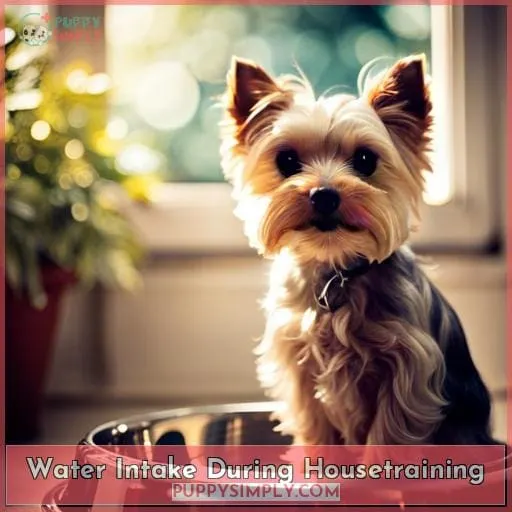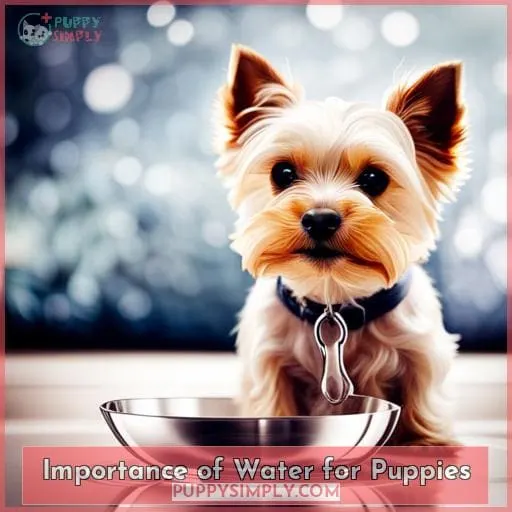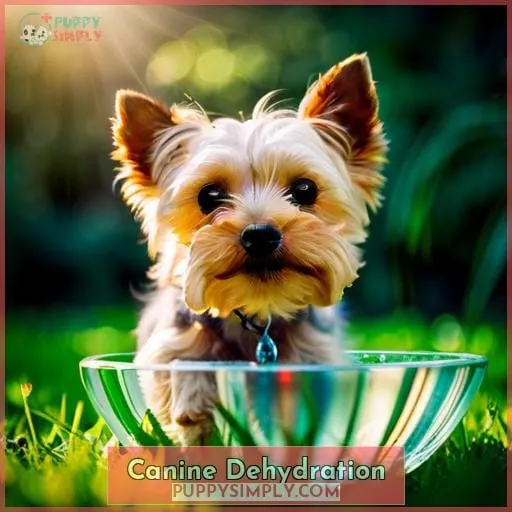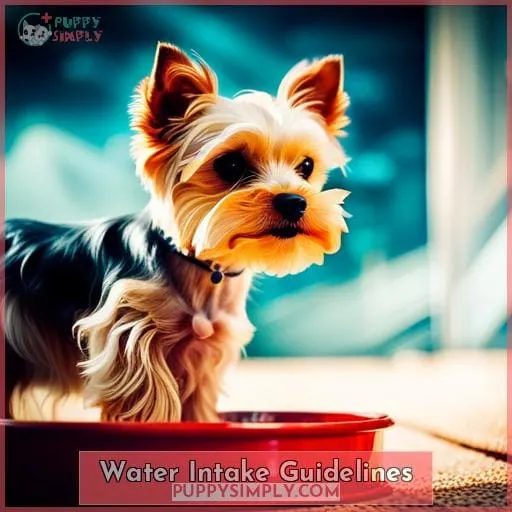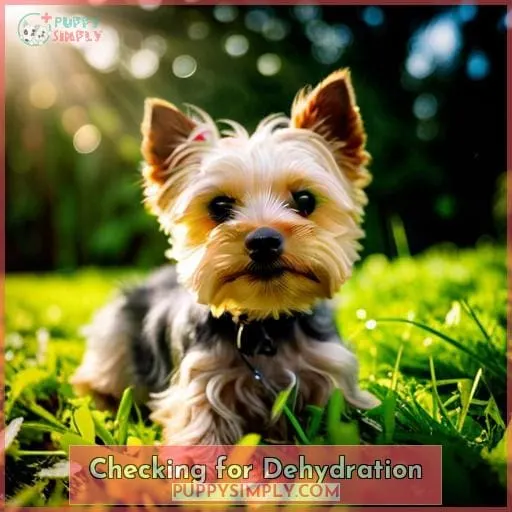This site is supported by our readers. We may earn a commission, at no cost to you, if you purchase through links.

How much water should you give them?
Too much or too little water can cause health problems, so it’s important to know how much your puppy needs.
This article will discuss:
- How much water is too much for Yorkie puppies
- Signs of dehydration
- How to prevent overhydration
You’ll also learn about:
- The importance of water for puppies
- Factors that affect their water intake
Table Of Contents
Key Takeaways
- Yorkie puppies during weaning get hydration from their mother’s milk. Once weaned, they need about 1/2 cup of water every 2 hours. Older puppies require 1/2 to 1 ounce of water per pound of body weight per day.
- Adjust water intake during housetraining to prevent accidents. Provide regular amounts of water throughout the day, but remove the water bowl 2-3 hours before bedtime.
- Water is essential for puppies’ health, constituting a large portion of their blood, transporting oxygen, eliminating toxins, and regulating body temperature. Dehydration can harm vital organs, so ensure adequate hydration.
- Be aware of signs of dehydration, such as vomiting, fever, excessive urination, diarrhea, or primarily eating dry food. Overhydration can also be harmful, leading to seizures, coma, and even death. Ensure fresh water is always available but avoid forcing your puppy to drink.
Puppy Water Needs
Puppy’s water needs depend on its age, weight, and activity level.
During the weaning process, a Yorkie puppy gets most of its hydration from its mother’s milk.
Once weaned, it needs about 1/2 cup of water every 2 hours.
As your puppy grows, its water intake increases.
Older puppies need 1/2 to 1 ounce of water per pound of body weight per day.
Active puppies may need more.
Monitor your puppy’s water intake to ensure it drinks enough but not too much.
Providing fresh, clean water daily is crucial for your Yorkie puppy’s health.
Water Intake During Housetraining
When housetraining your Yorkie puppy, you’ll need to adjust its water intake to prevent accidents.
Consistency is key.
Give your puppy regular amounts of water throughout the day, but remove its water bowl 2-3 hours before bedtime.
This will help prevent nighttime accidents and ensure your puppy sleeps through the night.
Nighttime Hydration:
Avoid giving your puppy water too close to bedtime.
This can lead to accidents in the crate or bed.
Consistent Training:
Stick to a regular potty break routine.
Take your puppy out frequently, especially after meals, naps, and playtime.
Potty Break Routine:
Establish a routine for your puppy’s potty breaks.
Take it out at the same times each day and praise it when it goes outside.
Restricting water intake too much can lead to dehydration, so always make sure your puppy has access to fresh water during the day.
Importance of Water for Puppies
With water making up a large portion of your puppy’s blood, it’s essential for transporting oxygen and clearing toxins. Water regulates body temperature, lubricates joints, and aids digestion. Dehydration can harm vital organs, so ensuring your puppy stays hydrated is crucial.
Here’s why water is essential for your puppy’s health:
Metabolic Processes
- Facilitates digestion, brain activity, blood flow, and breathing.
Impaired organ function, lethargy, weakness.
Blood Composition
- Blood is mostly water and transports oxygen, clears toxins.
Thickened blood, reduced oxygen delivery, organ damage.
Body Temperature Regulation
- Regulates body temperature through panting and sweating.
Heatstroke, organ damage.
Joint Lubrication
- Lubricates joints for smooth movement.
- Stiffness, pain, lameness.
Monitor your puppy’s water intake and provide fresh, clean water daily. Encourage drinking by keeping the water bowl clean, placing it near food and favorite spots, rewarding with treats, flavoring water, and offering ice cubes.
Canine Dehydration
You’ll want to watch out for signs of dehydration in your Yorkie puppy:
- Dry or sticky gums
- Slow skin snap-back
- Delayed gum refill time
Dehydration can occur due to:
- Vomiting
- Fever
- Excessive urination
- Diarrhea
- Eating mostly dry food
If you suspect dehydration, encourage your puppy to drink by:
- Keeping the water bowl clean
- Placing it near food and favorite spots
- Rewarding with treats
- Flavoring water
- Offering ice cubes
Prevention is key when it comes to canine dehydration:
- Ensure your puppy has access to fresh, clean water at all times
- Monitor their water intake, especially during hot weather or after exercise
- Feed them a balanced diet that includes wet food or homemade meals to provide additional moisture
If your puppy shows signs of dehydration, consult a veterinarian immediately.
Overhydration in Dogs
You should be aware of the signs of overhydration in dogs, as it can be just as dangerous as dehydration.
- Lethargy
- Nausea
- Loss of coordination
- Staggering
- Bloating
- Dilated
- Salivation
- Vomiting
- Gums
If you think your Yorkie puppy is overhydrated, take action immediately. Withhold water and consult your veterinarian promptly. Overhydration can lead to serious health problems, including seizures, coma, and even death.
Preventing overhydration is essential for your puppy’s well-bring. Ensure fresh water is always available but avoid forcing your puppy to drink.
- Monitor their water
- Avoid forcing your puppy to drink
- Consult your veterinarian for personalized advice
If you’re concerned about your puppy’s water consumption, consult your veterinarian for personalized advice.
Water Intake Guidelines
To ensure your Yorkie puppy’s overall health, you should provide them with a sufficient amount of water each day.
A general guideline is to offer one ounce of water per pound of body weight daily.
Several factors can affect your puppy’s water intake, including temperature, exercise level, and diet.
If you’re concerned that your puppy isn’t drinking enough water, there are a few things you can do to encourage them to drink more.
First, make sure their water bowl is clean and filled with fresh, cool water.
You can also try adding a little flavor to the water, such as a splash of chicken broth or unsweetened cranberry juice.
If you’re worried that your puppy is drinking too much water, talk to your veterinarian.
Excessive thirst can be a sign of underlying health problems, such as kidney disease or diabetes.
Factors Affecting Water Intake
Your Yorkie puppy’s water intake can vary based on their diet, activity level, and health.
Wet food and homemade diets provide moisture, while illness and pain can reduce their thirst.
Keep an eye on your puppy’s water intake to ensure they’re getting enough to stay hydrated and healthy.
Water Bowl Maintenance
In addition to meeting your Yorkie puppy’s daily water consumption, keeping clean water bowls is essential to prevent slime, germs, and contamination.
Opt for bowls made of materials like ceramics or non-reactive metal to prevent bacterial growth and color leakage.
A canine water fountain can encourage your puppy to drink more due to flowing water.
To maintain cleanliness, wash the bowl daily to remove slime and germs.
Carry water when you’re out and about to prevent dehydration.
Fresh or Frozen Fruit
How much water do you need to give your Yorkshire Terrier if you feed them fresh or frozen fruits?
You’ll need to provide less since fruits are high in water content.
Consider offering a variety of flavorful treats like watermelon, strawberries, or blueberries, which are rich in vitamins, nutrients, and antioxidants.
Not only do these snacks entice your pup to drink less water, but they also offer significant nutritional benefits that support canine hydration.
If you’re looking for alternatives, consider frozen fruits or ice cubes to keep your Yorkie cool and hydrated.
Portable Water
Carrying water when leaving the house ensures your Yorkie puppy stays hydrated during daily exercise or outings.
Be prepared with travel hydration solutions like a canine water bottle and travel bowl combination for easy carrying and cooling.
These accessories make it simple to provide water during outdoor adventures, whether you’re hiking, running errands, or visiting friends.
Signs of Dehydration
You can spot dehydration by checking for dry gums, sunken eyeballs, and a dry nose and mouth. A simple pinch test can also reveal dehydration: gently pull up the skin between your puppy’s shoulder blades and release it. If the skin doesn’t snap back quickly, your puppy may be dehydrated.
Dehydration Symptoms
| Symptom | Cause | Treatment |
|---|---|---|
| Dry, sticky gums | Loss of fluids | Offer small amounts of water frequently |
| Sunken eyes | Dehydration | Encourage your puppy to drink more water |
| Dry nose and mouth | Lack of saliva | Provide a humidifier to increase air moisture |
| Slow skin elasticity | Dehydration | Consult a veterinarian for rehydration advice |
Preventing dehydration is crucial for your puppy’s health. Monitor their water intake, especially during hot weather or after exercise. You can also offer them wet food or broth to increase their fluid consumption. If you suspect your puppy is dehydrated, contact your veterinarian immediately.
Checking for Dehydration
Pinching the skin between your Yorkie puppy’s shoulder blades can help check for dehydration. Pull the skin up gently and release it. Watch for the skin to fall back into place quickly.
If you’re concerned about your puppy’s hydration, there are several things you can do. Ensure they have access to fresh, clean water at all times. You can also offer them hydration techniques like ice cubes, flavored water, or wet food.
Monitoring their water intake and being aware of the signs of dehydration can help you keep your puppy healthy and hydrated.
Regularly checking your puppy’s hydration status is crucial for their well-being. Early detection of dehydration allows for prompt intervention and prevents severe complications. Stay vigilant and consult your veterinarian if you have concerns about your puppy’s hydration or overall health.
Conclusion
Like a river’s current, a Yorkie puppy’s body is mostly water.
It’s crucial to keep that flow healthy.
Giving your puppy too little or too much water can lead to serious health issues.
By understanding how much water your Yorkie puppy needs and recognizing signs of dehydration, you can help keep your furry friend happy and healthy.


